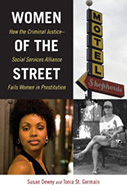Women of the Street: How the Criminal Justice-Social Services Alliance Fails Women in Prostitution

Authors: Susan Dewey and Tonia St. Germain
Publisher: New York: New York University Press, 2017. 288p.
Reviewer: Sharon S. Oselin | May 2017
This is perhaps the most insightful ethnographic book on women in the street-based sex trade published in some time. Women of the Street offers a new lens through which readers understand how this population grapples with external forces that greatly impact their lives – particularly the criminal justice system and social service providers. Based on extensive participation observations, a review of case files, and over one hundred interviews, Dewey and St. Germain focus primarily on the relationship between Denver-based street-involved women and the “criminal justice-social services alliance,” which aims to be therapeutic but often is simply punitive. The authors’ detailed investigation sheds light on an array of social actors that comprise this alliance, such as police officers, social workers, judges, court counselors, treatment providers, and probation officers. This rich account does not ignore the women’s voices but situates them within a nexus of social networks and actors, relationships difficult for them to completely eschew given their poverty and “racialized and gendered” vulnerabilities.
A cultural ethos among alliance professionals informs their decision-making and interactions with the women, based upon the following beliefs: (1) street sex trading and illicit drug use are harmful and result from trauma; (2) these women require socio-legal interventions to stop such behaviors; and (3) women can only demonstrate “progress” by complying with particular mandates and expectations regulated by professionals. The alliance ethos requires physical and ideological conformity for women, and allows little room for individualistic plans or goals that may deviate from this model. Such assessments disregard the structural disadvantages that profoundly affect this group, which ironically leads them to perform sex work in the first place, and compounds their risks and marginalization.
Although the authors point out the folly of such oversights, they note that many alliance professionals, like those they serve, experience frustration with the operating ethos that guides the agencies. Given the precarious and often inter-dependent relationships, both parties “accurately gauge one another’s inner states to make rapid decisions regarding their conduct during encounters” (pg. 8). But to what end? To actually improve the lives of women or to reproduce a narrowly constructed ideal of success that benefits the agencies? The sad take-away point of this book is that the alliance workers – whose occupational purpose is to enhance the well-being of disenfranchised women – end up falling far short of achieving this outcome — rendering the very notion of “help” inconsequential. They too, are constrained by a seemingly intractable legal system and culture that upholds the status quo. By the end of the book, Dewey and St. Germain offer readers a glimmer of hope when they present two alternatives to reigning practices – decriminalization of prostitution (which is unlikely), and changes within the alliance (much more feasible).
Despite the significant contributions of this book, I would appreciate a better understanding of how women in the street trade develop strategies to avoid alliance professionals and manage to maintain self-sufficiency. The authors categorize six distinct types of sex trading found among women, and some appear more or less connected to alliance professionals. I am curious to learn more about the agency of the women, what accounts for disparate levels of involvement with the alliance, and how the character and frequency of these relationships can minimize individual reliance on therapeutic aid. Moreover, were there cases where alliance workers used their expertise to “bend the rules” for women by providing resources without enacting social controls? This information could further identify reforms to the criminal justice-social service alliance so it can better serve street-involved women by accommodating their stated needs.
Sharon S. Oselin is an Associate Professor of Sociology at the University of California Riverside, and the Associate Director of the Presley Center for Crime and Justice Studies.


